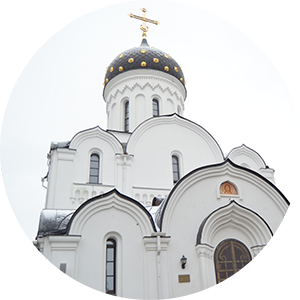A Saint
(from the Latin sanctus) is one who is holy, that is, set apart for God’s
service. It is a person who has cooperated with God’s grace to the extent that
his or her holiness is beyond doubt.
Saints in the Bible
In the
Holy Scripture, the word saint is used to refer to those who have been set
apart for the service of God, consecrated for his purposes. As such, all
members of the Church are called saints, regardless of their personal holiness
or sinlessness. It is still appropriate to use the term in this way.
Saints in the Church
Aside
from the more general use of the word saint to refer to all members of the
Church, Holy Tradition also ascribes Saint as a title to particular persons
whose lives have shown most clearly what it means to follow Jesus Christ. These
saints are popularly glorified (canonized) by the Church, often in the modern
era with a formal service to recognize and affirm the veneration of them by the
faithful.
Saints
are not thought of as either perfect or infallible, and it is only because of
the work of Christ in them that the Church praises these people. It is because
we see our Lord’s countenance reflected most clearly in their faces that we
publicly laud them, ask them to pray for us, and encourage one another to
follow their examples.
Recognition of Saints
The
people of the church do not create saints, they recognize as saints those whom
God himself has glorified, seeing in their lives true love for God and their
neighbors. From the beginning, the Church recognized the righteous ancestors of
Christ, forefathers, as grace-filled men and women whose lives were pleasing to
God. Also the prophets who predicted Christ’s coming and the apostles and
evangelists who proclaimed the Gospel were assumed to be saints. Next the
martyrs and confessors who risked their lives and shed their blood in witness
to Christ were also recognized as saints. In time, ascetics who followed Christ
through self denial, were numbered among the saints. Bishops and priests who
fought against heresy and proclaimed the true faith are recognized by the
Church as saints. Today, holy people, in all walks of life, can be recognized
as saints. (—From
OrthodoxWiki, Saints)
Prayer to the Saints
Prayer to
the Saints is encouraged by the Orthodox Church, because physical death is not
a defeat for a Christian. It is a glorious passage into heaven. The Christian
does not cease to be a part of the Church at death, nor is he or she set aside,
idle until the Day of Judgment.
The
Church is composed of all who are in Christ—in heaven and on earth. It is not
limited in membership to those presently alive. Those in heaven with Christ are
alive, in communion with God, worshiping God, doing their part in the Body of
Christ. They actively pray to God for all those in the Church and perhaps,
indeed, for the whole world. So we pray to the saints who have departed this
life, seeking their prayers, even as we ask Christian friends on earth to pray
for us. (—From
Antiochian.org, Prayer to the Saints)
The Virgin Mary
 Mary is
called Theotokos, meaning “God-bearer” or “the Mother of God,” because she bore
the Son of God in her womb and from her He took His humanity. Elizabeth, the
mother of John the Baptist, recognized this reality when she called Mary, “the
mother of my Lord” (Luke 1:43). Mary said of herself, “All generations will
call me blessed” (Luke 1:48). So we, in our generation, call her blessed. Mary
lived a chaste and holy life, and we honor her highly as the model of holiness,
the first of the redeemed, the Mother of the new humanity in her Son. (—From Antiochian.org, Mary)
Mary is
called Theotokos, meaning “God-bearer” or “the Mother of God,” because she bore
the Son of God in her womb and from her He took His humanity. Elizabeth, the
mother of John the Baptist, recognized this reality when she called Mary, “the
mother of my Lord” (Luke 1:43). Mary said of herself, “All generations will
call me blessed” (Luke 1:48). So we, in our generation, call her blessed. Mary
lived a chaste and holy life, and we honor her highly as the model of holiness,
the first of the redeemed, the Mother of the new humanity in her Son. (—From Antiochian.org, Mary)
Source: http://stgeorgegr.com/orthodoxy/beliefs/saints/


















CONVERSATION